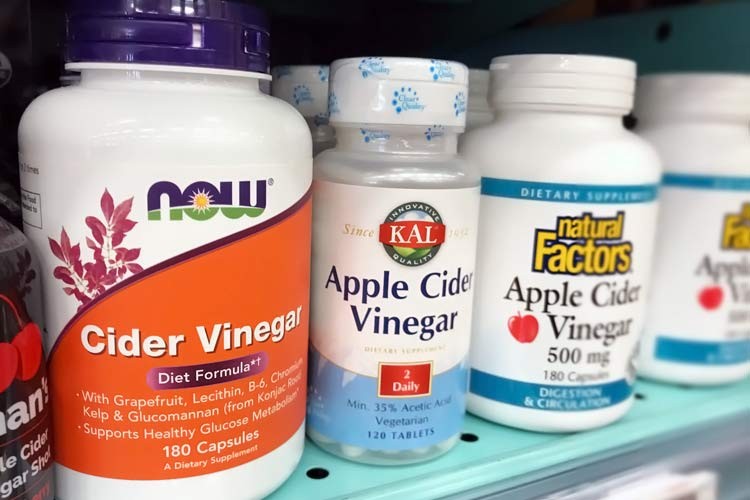
Crisp, tangy apple cider vinegar is likely one of your household staples. You can whip up a tasty vinaigrette dressing, cook better hard-boiled eggs, and preserve food with this versatile liquid. Made from fermented apple juice, apple cider vinegar contains acetic acid plus key nutrients such as vitamins B and C.
Apple Cider Vinegar’s Non-food Applications
However, you might not realize that early civilizations used apple cider vinegar for medicinal purposes. Hippocrates treated sores, wounds, and fever with it. In colonial America, early medical practitioners treated stomachaches, edema, and poison ivy with this go-to liquid.
Apple cider vinegar has recently gained considerable attention for its supposed ability to trigger weight loss. To determine whether these claims are true, we dug deep into the available research on this controversial topic.
Snapshot of Weight Loss Basics
You’ll achieve long-term weight loss by combining two key program components. First, choose healthy foods with plenty of nutrients so your body can function well and maintain energy for your daily activities. These proteins, carbohydrates, and fats also fuel your exercise program.
The Kilocalorie Deficit’s Role in Weight Loss
Losing weight is the result of a simple equation. Each day, your meals and snacks provide you with a certain number of kilocalories. During the same period, you burn kilocalories through your normal activities and through exercise. If you consume fewer kilocalories than you burn, you will lose weight over time. However, the opposite is also true. If you eat more kilocalories than you burn, you’ll experience the insidious “weight creep” that’s tough to turn around. Generally speaking, cutting 500 to 1,000 kilocalories daily from your diet will lead to a .45-kilogram weekly weight loss. Because everyone’s metabolism is different, however, you may experience fluctuations in your weight loss rate and amount.Weight Loss vs Fat Loss
To clarify, losing weight and losing fat are two different things. When you lose weight, your total body weight is decreased through loss of muscle, fat, and water. In contrast, fat loss refers only to the reduction of fat. Using a scale will enable you to track your overall weight loss. However, the scale will not tell you whether you are losing fat (desirable) or muscle (not so desirable). To provide a reasonably accurate picture of your body composition, and to measure your body’s fat and muscle percentages, a body fat scale is your best bet.Promote Fat Loss and Muscle Maintenance
To set the stage for fat loss, and keep or slightly add to your muscle mass, consume lots of quality protein. In addition, eating a nutritionally dense diet will result in a small kilocalorie deficit. Don’t drop more than 500-600 kilocalories from your daily diet, as that will result in undesirable muscle loss.
Finally, follow a regular exercise program that helps to burn those unnecessary kilocalories. As a template, the United States Department of Health and Human Services has issued the Physical Activity Guidelines for Americans. Adults should spend 150–300 minutes weekly on cardio and muscle-building activities that engage all major muscle groups.
Apple Cider Vinegar Product Usage
Over the years, apple cider vinegar has been touted for its purported weight loss benefits. Proponents say that taking a pre-meal drink, or downing a pre-meal supplement, helps to diminish the appetite and burn unwelcome fat. This supposedly leads to successful weight loss.
Types of Apple Cider Vinegar Products
Apple cider vinegar is available in several liquid varieties. First, health professionals do not recommend drinking it “straight.” The vinegar’s high acidity levels can damage your esophagus and erode tooth enamel.
Several beverage manufacturers offer an apple cider vinegar drink with added sweeteners such as honey or maple syrup. In addition, the Internet is chock-full of bloggers who offer their own creative recipes. If you can’t bear the thought of drinking apple cider vinegar in any form, tablets and capsules are also available.
Apple Cider Vinegar Gummies
No discussion of apple cider vinegar products would be complete without mentioning popular gummies. For perspective, four typical gummies collectively contain about 29.57ml of apple cider vinegar.
Realize that the gummies’ pleasantly sweet taste results from a substantial amount of sugar. The product also contains other additives and stabilizers that create that gummy consistency. Whether the gummies help to suppress your appetite or not, ingesting high amounts of sugar is counterproductive to weight loss.

Two Apple Cider Vinegar Caveats
There isn’t a standard recommendation for apple cider vinegar consumption. Whether you prefer a beverage, tablet, capsule, or gummy, consult with your physician to determine the amount you can consume. If you purchase a commercially available product, look for a third-party seal of approval on the package.
Finally, apple cider vinegar is not recommended for anyone with low potassium levels, as it could help to worsen the deficiency. An apple cider vinegar formulation can also negatively interact with certain medications. Examples include diuretic drugs and insulin. The bottom line: If you take medication or have any health conditions, consult with your doctor before ingesting apple cider vinegar in any form.

Does Apple Cider Vinegar Promote Weight Loss?
With growing interest in non-pharmaceutical solutions to common health issues, researchers have become involved in the ongoing apple cider vinegar debate. Some animal research studies have indicated that the vinegar’s acetic acid could contribute to weight loss in multiple ways:
- Suppresses Appetite
- Increases Metabolism
- Burns Fat
- Decreases Fat Storage
- Reduces Blood Sugar Levels
- Decreases Insulin Levels
Collectively, the animal studies appear to suggest that apple cider vinegar plays a role in weight loss. However, multiple human studies are necessary to confirm these findings.[3]
Source: Healthline.com
Contrasting Findings from 2021 Human Study
In April 2021, the International Journal of Exercise Science published a study on the effect of semi-acute vinegar supplementation on resting and exercise energy usage. Researchers commissioned this study after reading about two previous human studies that reported that vinegar supplementation was linked to substantial losses of body mass and fat mass.
Achieving Your Weight Loss Objectives
With conflicting evidence about apple cider vinegar’s effectiveness as a weight loss tool, following a well-designed weight loss program is more important than ever. Consistently focus on three program components that together will deliver results.
Choose an Achievable Goal
Setting an achievable weight loss goal increases your chances of success. For starters, target a weight loss of 0.5 to 1 kilogram every week. That means you must burn 500 to 1,000 kilocalories more than you eat every day. With a reduced-kilocalorie diet and some form of regular exercise, that goal is definitely within your reach.
Although choosing a bigger weight loss goal sounds enticing, you’re setting yourself up for failure. You’ll be required to adhere to rigid guidelines that don’t allow you to eat many foods you enjoy. You’ll resent those restrictions, increasing the odds that you’ll sabotage yourself with “forbidden” foods.
Discover a Feast of Healthier Foods
Decreasing your daily calorie consumption doesn’t have to be boring. And, it doesn’t mean you have to spend hours in the kitchen preparing special meals. Depending on your food plan, you may even be able to incorporate some of your favorite foods into the menu.
Consuming more plant-sourced foods is a great starting point. Vegetables, fruits, and whole grains offer a veritable feast of nutrients. With varied preparation methods, and an aromatic array of spices and seasonings, you can enjoy tasty meals that are pleasantly satisfying and healthy.

These six simple guidelines provide a workable meal planning template:
- Consume at least four vegetable servings and three fruit servings daily.
- Eat limited amounts of poultry and lean meats.
- Switch to whole grains instead of refined grains.
- Switch to low-fat dairy products. Hint: Low-fat Greek yogurt is a protein-packed food that goes well with granola, fruit, or savory toppings.
- Use healthy fats in moderation. Examples: olive oil, avocados, nut butters, and nuts.
- Decrease your daily sugar intake (except for fruit’s natural sugar).
Banish Extra Kilocalories with Exercise
Yes, it’s possible to obtain weight loss without regular exercise. However, regular physical activity helps to increase your metabolism. You’ll burn excess kilocalories and turn your body into a more efficient machine.
Consistent physical activity also helps to decrease your blood pressure and improve your cardiovascular system. Finally, regular exercise has proven mood-boosting benefits.
Everyone starts an exercise program at a different point. First, consult with your doctor if you have any health issues. Based on their recommendations, engage in some type of physical activity on most days. A 30-minute aerobic exercise session is a good starting point. Walking, jogging, leaf raking, and vigorous weed pulling all count as aerobic activity.
Like other worthwhile goals, you may run into a few roadblocks along the way. With a clear objective in mind, though, you can view these issues as minor inconveniences that won’t stand in the way of achieving weight loss success.



